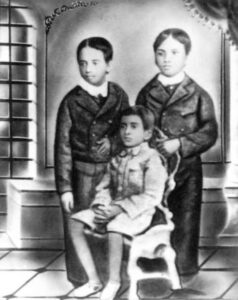Education & Early Interest in Politics, England 1879-1893 (age 7-21)

1879: At the age of 7, Sri Aurobindo, along with his 2 elder brothers are taken to England for education
Dr. Krishna Dhan Ghosh takes Sri Aurobindo and his two elder brothers to Manchester, England for their education, where they live with Rev. Drewett and his wife. Before leavin g Manchester, Dr. Ghose gives strict instructions to the Drewett’s that his sons should not be allowed to make the acquaintance of any Indians or to undergo any Indian influence. Too young to attend school, Sri Aurobindo is home schooled by the Drewett’s and learns Latin, history, English literature, and more from them.
g Manchester, Dr. Ghose gives strict instructions to the Drewett’s that his sons should not be allowed to make the acquaintance of any Indians or to undergo any Indian influence. Too young to attend school, Sri Aurobindo is home schooled by the Drewett’s and learns Latin, history, English literature, and more from them.
Sept. 1884: Admitted to St. Paul School, London at age 14
In 1984, Sri Aurobindo and his brothers move to London and are enrolled in St. Paul School, one of the premier educational institutions in England. Already proficient in English, Greek and Latin, Sri Aurobindo now learns Italian and French and some German and Spanish. He is distinguished for his mastery of the classics and proficiency in literature and history and is an active member of the Literary Society of the school. A favorite poem of his is Percy Bysshe Shelley’s The Revolt of Islam. Sri Aurobindo recalls: “There was no other effect of reading it except this, that I had a thought that I would dedicate my life to a similar World-change and take part in it.”
June 1890: Passes ICS examination at age 17
From the time Sri Aurobindo lands in England, his father expresses the desire for him to join the ICS (Indian Civil Service). The ICS requires a candidate (‘probationer’) to complete the Tripos (a three-year program at King’s College), within two years of the ICS qualifying examination. Hence, most students complete their first year at the college and then take a year of special tutorials to prepare for one of the toughest examinations in the world before sitting for the ICS examination. In this way, the two-year period corresponds with the completion of the three-year Tripos degree. Moreover, the probationer is required to clear two periodic assessments and a final one. After successfully clearing the first and second assessment examination, the probationer receives a stiped of 75 pounds each time and 150 pounds upon passing the final examination.
Due to his need for money during these days – not just for himself, but his brothers too – Sri Aurobindo takes the ICS exam straight after finishing his studies at St. Paul’s at the age of 17 and with no special preparation. He passes brilliantly, scoring record marks in Latin and Greek and secures an overall rank of 11th among 250 successful candidates.
1980-1982: Attends King’s College, Cambridge at age 18
Sri Aurobindo is awarded a Classical scholarship to attend King’s College. He is given a room in the college and except for vacations, stays in Cambridge for the next two years. His reputation as a Classical scholar precedes him at Cambridge. One of the senior tutors, G.W. Prothero, invites him to meet Oscar Browning, a well-known scholar and intellectual in the university at the time. There is a very interesting letter from Sri Aurobindo to his father.
During his two years at Cambridge, Sri Aurobindo did not spend all his time on academic studies but participates fully in the University activities. He continues to be in love with poetry, reading widely as was his habit, but also now writing poems more frequently.
As a student, his interests extend beyond the school’s curriculum. He is deeply interested in Indian politics and the liberation of his mother country from British rule. He becomes Secretary of the Indian Majlis, an association of Indian students at Cambridge, and delivers revolutionary speeches. During this time, he also joins a secret society: Lotus and Dagger, in which each member vows to work for the liberation of India. Among his colleagues is C.B. Beachcroft, who is later a judge who tries him in an important political case.
Aug – Nov 1982: Fails to appear for the ICS final exam, the horsemanship test at age 20
At the end of two years of the ICS probation period, it is time for Sri Aurobindo to present himself at the final exam, a horsemanship test. Yet, he fails to appear for the exam. This occurs not once, but on four different occasions. Instead, he decides to go for a walk. Thus, he is disqualified for the ICS. It is an extraordinary occurrence with hardly any precedent.
Sri Aurobindo’s rejection from the ICS is much commented on during his lifetime. Wanting to clear up the controversy fifty years after the event, he wrote that he managed “by certain manoeuvres,” to “get himself disqualified for riding without himself rejecting the Service, which his family would not have allowed him to do.”
Yet, Sri Aurobindo had made up his mind to serve his countrymen, but not through the ordinary notion of service with the Indian Civil Service, which he must have realized was neither Indian, nor civil, nor service. His overwhelming desire to serve the people of India – to sacrifice almost everything in the process – causes him to leave England and return to his homeland in early 1893.
